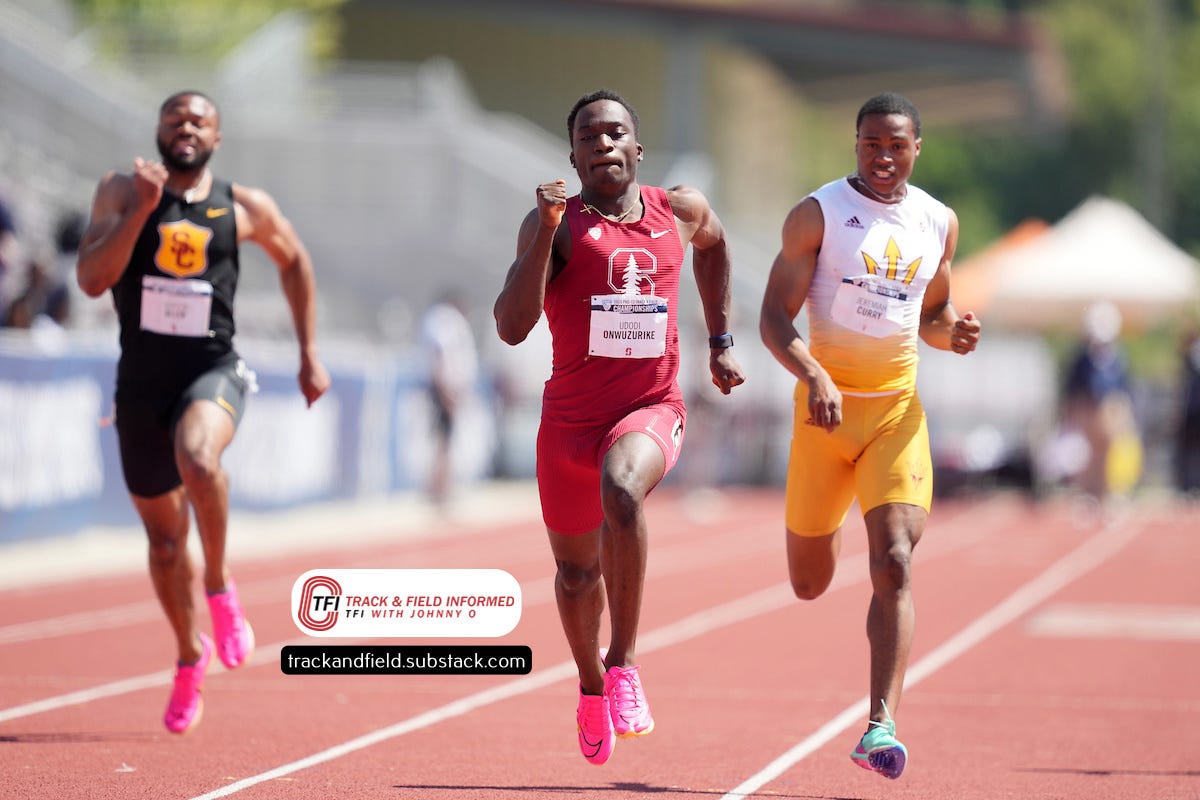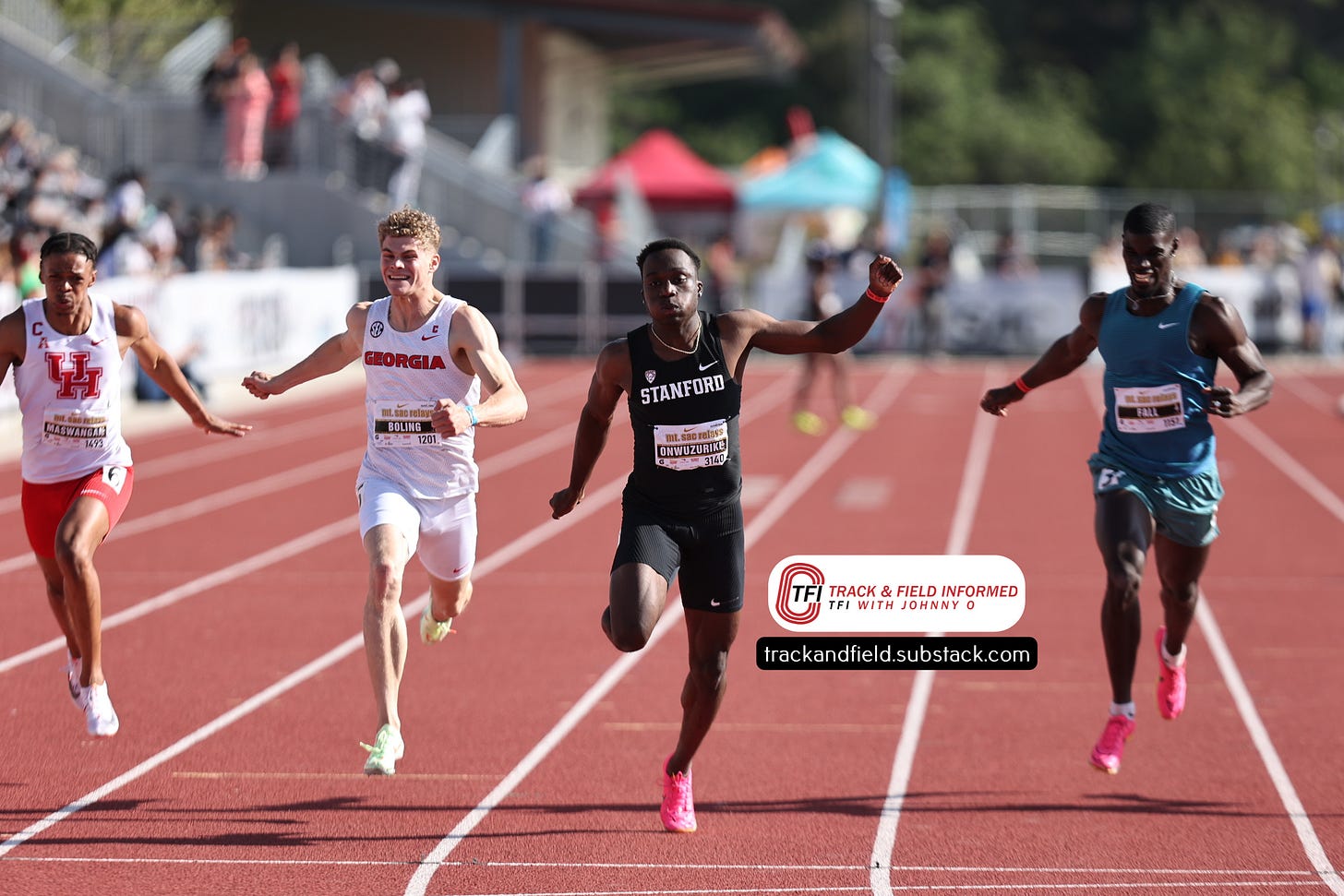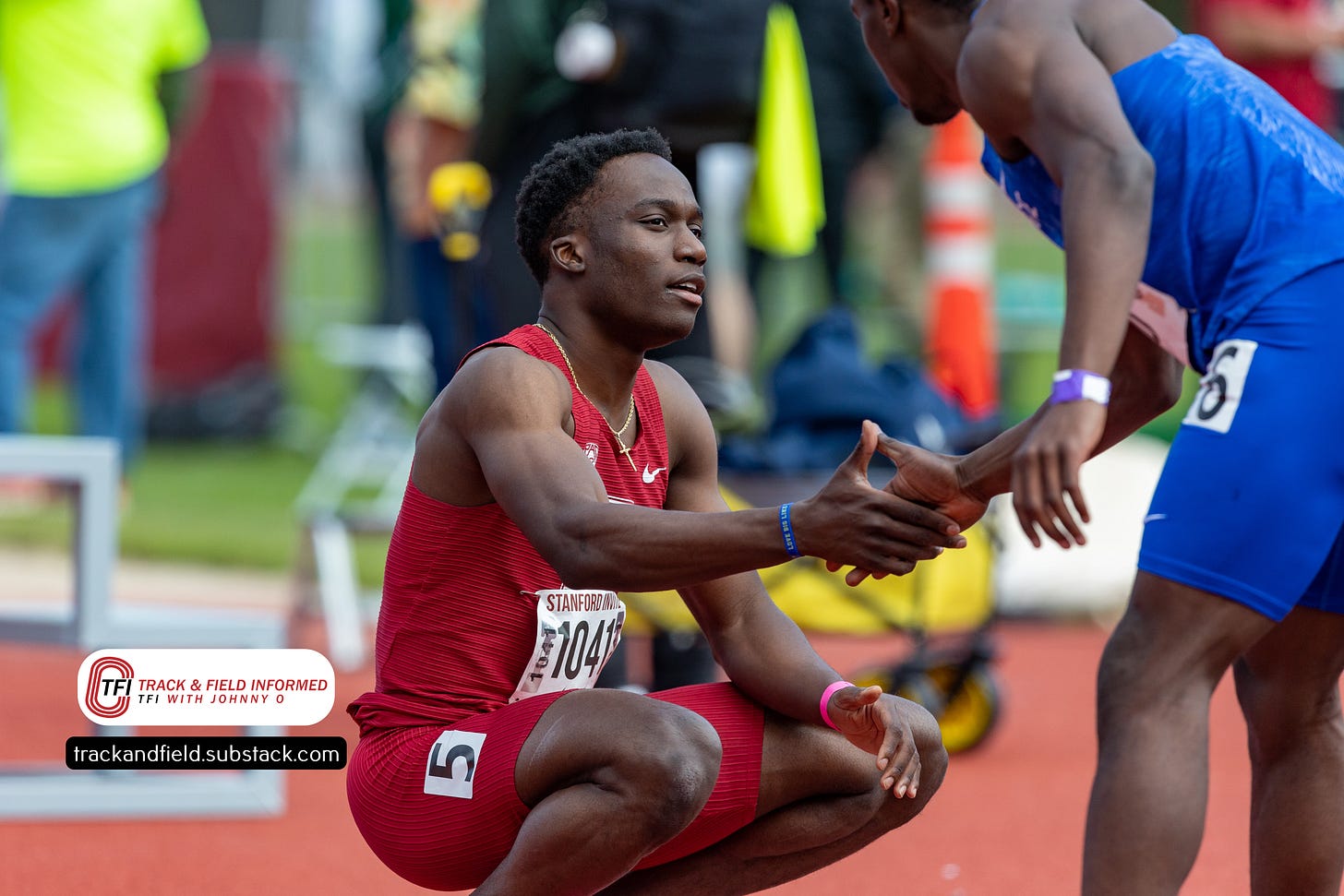Sophomore gem brightens Stanford sprint program with top collegiate ranking
Onwuzurike expected to contend for titles in men's 100 and 200 meters in NCAA Championships

Assistant track and field coach Jarius Cooper of Stanford University hoped he had uncovered a hidden gem in November of 2020 when an up-and-coming sprinter from southeast Michigan signed a national letter of intent with the Cardinal.
At that point, the senior from Brother Rice High School in Bloomfield Hills had run 10.60 seconds in the 100 meters and 21.12 in the 200. But those marks had come during an AAU Junior Olympics meet in North Las Vegas in July in which searing hot temperatures caused the wind gauges to malfunction so there were no wind readings for either performance.
Later today that sprinter — Udodi Onwuzurike — will be the top-ranked entry in the men’s 200 meters and the No. 2 entrant in the 100 when the NCAA Track and Field Championships begin at Mike A. Myers Stadium at the University of Texas in Austin.
The semifinal heats of the 100 will start at 7:46 p.m., Central Daylight Time, with the semifinals of the 200 beginning at 8:44.
If Onwuzurike advances out of his races as expected, he will compete in the final of the 100 at 8:52 p.m. on Friday night, followed by the final of the 200 at 9:37.
“He was extremely talented and his times were starting to trend in the right direction,” Cooper said when asked about what he saw in Onwuzurike as he recruited him during the first year of the COVID-19 pandemic. “I really liked his top-end speed and figured we could work on his start. His start looks a lot different now that it did in high school.”
Onwuzurike’s collegiate performances, which include a third-place finish in the 200 in the NCAA meet as a freshman last year and bests of 9.92 in the 100 and 19.91 in the 200 this year, could change national perceptions of the Cardinal’s men’s track and field program.
It had been known since the mid-1990s as a haven for middle- and long-distance runners. Stanford has won five NCAA cross country championships during that time — and finished second three other times — and its runners have combined to win 12 NCAA individual track titles in races ranging from the 1,500 meters to the 10,000.
Onwuzurike, the third of four children born to Nigerian parents who have lived in the U.S. for 41 years, knew that Stanford did not have a reputation as a sprint program when he signed. But attaining a great education factored highest in choosing a college, and he’d developed a solid rapport with Cooper and J.J. Clark, Stanford’s director of track and field and cross country, during the recruiting process.
“I definitely felt like they were people I could work well with,” Onwuzurike said. “I also feel like I’m one of those guys who does not need to be in the SEC or the Big Ten to run fast. I can do that anywhere. I just felt like Stanford was the best place for me. I just know me. How I am, and how I train. I can go anywhere and be the best.”
While Onwuzurike has always had an outward confidence about his sprinting abilities, it has taken time to get his track performances to where they are today.
After playing basketball and soccer as a young child, he became involved in track in sixth grade. He performed well during his first few seasons in the sprints and lowered his personal bests to 10.87 in the 100 and 21.36 in the 200 during the summer of 2019 prior to his sophomore year at Brother Rice.
He then ran 6.84 for 60 meters and 21.55 for 200 — on a 300-meter track — during the 2020 indoor season before the onset of the COVID-19 pandemic led to the cancellation of the outdoor high school track season. Some youth meets — with safety protocols in place — were held during the summer and that was when Onwuzurike ran 10.60 in the 100 and 21.12 in the 200 while winning the men’s 17-18 titles in the West Coast AAU Junior Olympics at the Pearson Center in North Las Vegas on July 12.
Onwuzurike had run 10.65 in his 100-meter qualifying heat the previous day, but when temperatures hit 115 degrees Fahrenheit (46 Celsius) that afternoon, the remainder of the meet that day was cancelled due to safety concerns for the participants and officials.
The brutal temperatures, which were no doubt higher on the track than the official reading, caused the wind gauges to malfunction and they were still not working the following day when the intense heat had dissipated and the meet was completed.
Despite any uncertainty about the wind readings for Onwuzurike’s performances, Stanford assistant Cooper liked what he saw.
DeRon Early, the sprints coach at Brother Rice and the head coach of the Prime Time Performance Track Club for which Onwuzurike was competing in Las Vegas, recalls a note being delivered to Udodi at the hotel in which Cooper congratulated him on his victories.
“Stanford was the first school who contacted Dodi,” Early said. “I think that made a real impression on him.”
Although Onwuzurike’s father, Chris, said he also gave serious consideration to USC, UCLA, Oregon, Duke, and Michigan, and Udodi himself said he also thought about Michigan State, he ultimately chose Stanford, despite never making an official recruiting trip there or to any of the other schools he was considering.
“It was a leap of faith, a little bit,” Onwuzurike said. “But I did feel really good about coming to Stanford. It just felt like the right place for me.”

With the recruiting process out of the way before December of his senior year, Onwuzurike set his sights on having a standout final high school campaign after his junior season — and so much of life in general —had been dramatically altered by the COVID-19 pandemic.
He lowered his 60-meter time to 6.81 in the 60 during the indoor season and also ran a personal best of 20.90 in the 200 while winning the Michigan Indoor Track Series final while running on a 300-meter oval at the Lincoln Athletic Building in Ypsilanti. However, hamstring issues hampered him during much of the outdoor season and it wasn’t until the middle of May that he felt like he was hitting his stride.
He won his first Michigan High School Athletic Association Lower Peninsula Division 1 titles in early June, but was frustrated when stiff winds measuring negative 6.0 and negative 3.8 meters-per-second limited his winning times to 10.55 in the 100 and 21.23 in the 200.
“He was really frustrated, especially with the 100 time,” Early said. “But I told him that people would see the wind reading and know that he was capable of running much faster than that.”
The organizers of the Brooks PR Invitational in Seattle were happy to have Onwuzurike run in their high school meet at the University of Washington in early July. And it was there that any questions about his 10.55 clocking in June were laid to rest. His winning time of 10.23 vaulted him to third on the national high school performer list for the year and made him the fastest Michigan prep century sprinter ever.
He then criss-crossed the country a couple of times during the next three weeks as he pursued a quest to qualify for the Nigerian team that was going to compete in the World Athletics U20 (under 20) Championships in Nairobi, Kenya, in August.
Although Onwuzurike was born in Detroit and grew up in suburban West Bloomfield in Michigan — and is a “Michigan Guy” through and through, according to Cooper — he and his family made regular trips to Nigeria as he was growing up to celebrate Christmas with relatives.
He developed a great affinity for the country and its people during those visits. And when USA Track & Field announced in early July of 2021 that the U.S. would not be participating in the U20 Championships due to safety concerns about COVID-19, Chris Onwuzurike and Early quickly began to investigate if it would be possible for Dodi to compete for Nigeria since he had dual citizenship in that country and the U.S.
It turned out there was a way. But due to various rules and regulations, he would first have to post qualifying times while officially running as a representative of Nigeria.
That led to him running 10.43 to place sixth in a heat of the men’s 100 meters in the Stars & Stripes Classic at Marietta High School in Georgia on July 9 before timing a then-personal best of 20.78 to finish fourth in the men’s 200 in the Sound Running Sunset Tour meet at Azusa Pacific University in California on July 25.
Shortly after that, he was named to Nigeria’s U20 team in the 200 meters. And on August 21, he won the World title in a personal best of 20.21 after clocking 20.47 and a wind-aided 20.13, respectively, in a first-round heat and semifinal the previous day.
The 20.21 clocking was no doubt aided by Nairobi’s elevation of 5,500 feet (1,680 meters), but it nonetheless moved Onwuzurike to sixth on the all-time U.S. national high school performer list. In addition, the victory had a profound effect on him.
“I always felt like I was capable of something like that, but I didn’t always believe in myself,” he said. “But to come out there and run for my country and win a U20 World title was amazing and changed the trajectory of my entire track career.”
Asked to elaborate he added, “It gave me a lot more capital. I always dreamed of being able to run on a big stage for my country, but I never felt like I’d be able to do it. When I was finally able to do it, I almost felt like, If I can do this, I can do anything I set my mind to.”
Shortly after his victory in the World U20 Championships, he arrived at Stanford, a school that had not had a men’s sprinter advance to NCAA Championships in both short sprints since 1963 when Larry Questad won the 100-yard dash.
Onwuzurike began to rewrite the Stanford record books during the first meet of the indoor season and by the end of his freshman year, he had run 10.03 in the 100 and 20.08 in the 200 to obliterate the previous school records of 10.38 — set by Darrin Nelson in 1980 — and 20.33 — set by James Lofton in 1978.
Nelson and Lofton were standout football players who also competed in track. Lofton, who still holds the school record in the long jump at 27 feet (8.23 meters), went on to a Hall of Fame career in the NFL during which he played wide receiver from 1978-93.
Onwuzurike capped his freshman collegiate season with a third-place time of 20.15 in the 200 in the NCAA meet last year after being eliminated in the semifinals of the 100. Then came the World Athletics Championships in Eugene, Oregon in July.
While once again running for Nigeria, he was eliminated in the first round of the 100 and in the semifinals of the 200, before he and teammate Godson Oghenebrume dropped the baton on the third — and final — exchange during a qualifying heat of the 400 relay.
He followed that with a sixth-place finish in the 200 in the Commonwealth Games in Birmingham, England two and a half weeks later before he teamed up with Favour Ashe, Alaba Akintola, and Raymond Ekevwo to win a bronze medal for Nigeria in the 400 relay.

“It was good, but it wasn’t perfect,” Onwuzurike said about his first year as a collegian. “I had some pretty lofty goals. I wanted to go under 10 seconds in the 100 and under 20 in the 200, but I wasn’t able to get that done. At the same time, I was able to increase my profile and got the chance to train with a bunch of teammates around me every single day. That was nice because a lot of time in high school, I was training by myself… There was a lot to get used to, but I feel overall like the year was pretty good.”
When it came to his experience in the World Championships, Onwuzurike said he tried to soak up as much information as possible during the meet that was held at Hayward Field on the University of Oregon campus.
He said it was eye-opening to compete against sprinters he had watched run in the Olympic Games in Tokyo the previous summer.
“When you’re finally there, you have a map,” he said. “You’re at the highest level, so you’ve got to act that way. You’ve got to train that way. You’ve got to discipline yourself that way. I watched these high-level sprinters run, how they compete, how they prepare. Just being around that environment, it was eye-opening.”
Onwuzurike describes himself as a pretty easy-going guy who is very faith-based. He firmly believes that without God, he would not be where he is today.
He also says his intense passion for sprinting is one of his strengths, but admits that watching people like two-time 200-meter gold medalist Noah Lyles of the U.S. in the World Championships made him realize he wasn’t where he needed to be to compete for medals at the highest level. That he still had a lot of work to do.
“Everyone has lofty goals to run one day like these high-level sprinters,” he said. “But not everybody knows what it takes. Not everyone understands how difficult it is to really perform day in and day out at that level - that when the lights are brightest, you’re ready to perform.”
Performing well in the biggest meets is not easy. For some, it’s almost a learned behavior, where they might underperform a few times before making the necessary mental and physical adjustments so they can turn in their best efforts in the highest-level competitions.
Onwuzurike may have learned a lesson like that in the NCAA Indoor Championships at the Albuquerque Convention Center in Albuquerque, New Mexico in early March.
On the first day of the two-day meet, he and Tarsis Orogot of Alabama posted the fastest qualifying times in the men’s 200 meters when they each ran 20.17 in their respective heats.
But in the finals the next day, Onwuzurike ran 20.36 to place second in his section and fifth overall as Matthew Boling of Georgia won the title in 20.12 after running 20.31 in his qualifying heat.
Onwuzurike has run steadily faster during the course of the outdoor season.
After ending April with season bests of 10.07 in the 100 and 20.14 in the 200, he ran 19.91 to win the 200 in the Pac-12 Conference meet at Mt. San Antonio College in Walnut, California on May 14. That performance followed an earlier runner-up finish in the 100 in which Oregon’s Micah Williams ran 10.22 into a 1.2 meter-per-second headwind to finish a hundredth of a second ahead of Onwuzurike.
Twelve days later, Onwuzurike ran a personal best of 9.92 in the 100, along with a 20.07 clocking in the 200 while winning his quarterfinal heats of the NCAA West Preliminary meet at Cal State Sacramento.
Those May performances have Cooper and Onwuzurike feeling good about his chances as he enters the NCAA Championships, in which Oghenebrume of LSU and Ashe of Auburn are expected to contend for the 100-meter title.
“I’m really excited about this meet,” Cooper said. “I believe he’s ready for this challenge. We’re excited about what he’s capable of accomplishing in this meet.”
Onwuzurike seconded his coach’s assessment. “We feel like we’ve done everything we can to get ourselves in a position where we can go out there and do our best. Right now, my mindset is like, I’m perfect as I am and I’m ready to go. You know?”



